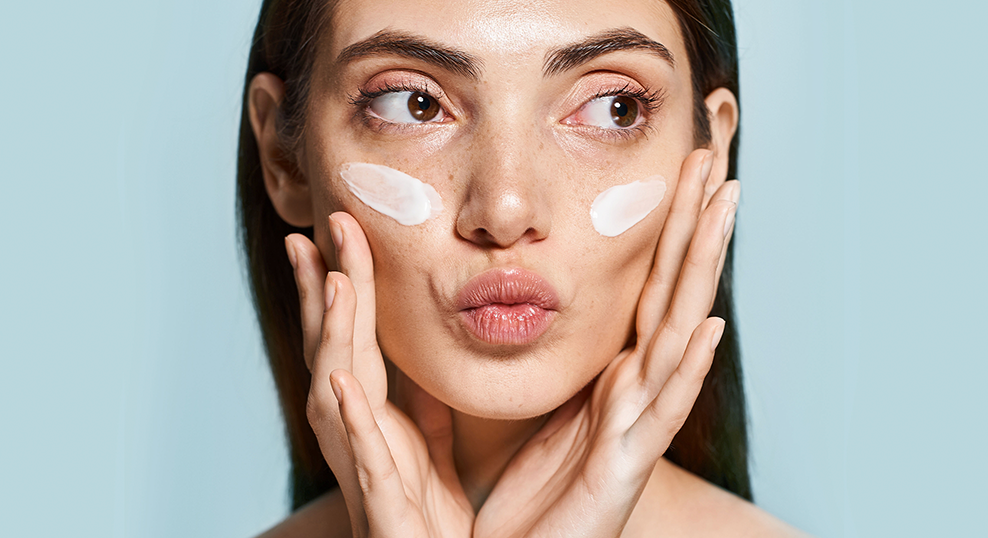15th OCT 2025
Guide to Soothing Your Skin

Skinsights > Guide to Soothing Your Skin
Skin Barrier 101: A Guide to Soothing Your Skin
- Your skin barrier, also known as the stratum corneum, is the outermost layer of your skin. Think of it as a protective shield made of lipids, ceramides, and skin cells. This barrier has two critical jobs: locking in essential hydration and keeping harmful irritants out.
- When your skin barrier is healthy, your skin feels smooth, resilient, and comfortable. It looks and feels its best. But when it’s compromised, the effects are often immediate and hard to ignore. A damaged barrier can lead to a cycle of irritation and discomfort, leaving your skin feeling sensitive and reactive. Understanding how to care for this vital layer is the foundation of healthy, happy skin.
Signs of a Damaged Skin Barrier
- A weakened skin barrier often reveals itself through a combination of symptoms. If you’re experiencing several of the following signs, your barrier is likely under stress and in need of some TLC.
- Dryness and Dehydration: Your skin might feel tight, look flaky, or have a rough texture. This happens because a damaged barrier can't effectively hold onto moisture.
- Redness and Irritation: You may notice visible redness or blotchiness, which can become more pronounced after cleansing or applying products.
- Increased Sensitivity: Products that you normally tolerate might suddenly cause a stinging or burning sensation. This is a classic sign that your skin's defenses are down.
- Breakouts or Inflammation: A compromised barrier can allow bacteria and irritants to penetrate the skin more easily, leading to breakouts and inflammation.
- Delayed Healing: You might find that cuts, blemishes, or other minor skin irritations take much longer than usual to heal and recover.
What Causes Skin Barrier Damage?
- Understanding the root cause of barrier damage is the first step toward repairing it. While some people are genetically prone to a weaker barrier, lifestyle and skincare habits are often the main culprits.
- Overuse of Active Ingredients
Active ingredients like retinoids, strong exfoliating acids (AHAs and BHAs), and benzoyl peroxide are powerful and effective. However, using them too frequently or in high concentrations can overwhelm your skin, stripping its natural oils and weakening its protective layer. - Over-Cleansing
Washing your face too often or using harsh, foaming cleansers can be just as damaging. These habits strip away the protective oils that keep your barrier intact, leaving it vulnerable to irritation and dehydration. - Environmental Stress
External factors play a significant role in your skin's health. Cold, dry weather, low humidity from air conditioning, pollution, and UV exposure all contribute to weakening the skin barrier over time. - Inadequate Hydration
If your routine lacks sufficient moisturizing ingredients, your skin won't have the resources to maintain its protective functions. Consistent hydration is essential for a resilient barrier. - Underlying Skin Conditions
Certain skin conditions, such as eczema, psoriasis, and rosacea, are intrinsically linked with an impaired skin barrier. Managing these conditions often involves a focus on barrier repair and support.
How to Repair and Protect Your Skin Barrier
- The good news is that with the right approach, you can repair your skin barrier and restore its function. It requires patience and a gentle touch, but the results are well worth it.
1. Simplify Your Routine
- The first rule of barrier repair is to go back to basics. Pause any aggressive active ingredients like retinoids or exfoliating acids until your skin has fully recovered. For now, your routine should focus on three simple steps: gentle cleansing, moisturizing, and sun protection. Stick to fragrance-free products designed for sensitive skin.
2. Prioritize Barrier-Repairing Ingredients
- When choosing your products, look for formulas packed with ingredients known to support and replenish the skin barrier. Key ingredients to look for include:
- Ceramides: These are lipids that are naturally found in the skin and are crucial for reinforcing its barrier and retaining moisture.
- Hyaluronic Acid: A powerful humectant that draws moisture into the skin, providing deep hydration.
- Fatty Acids & Cholesterol: These components help restore the skin's protective layer and improve its resilience.
- Panthenol & Allantoin: These are soothing agents that help calm irritation and reduce redness.
3. Use Gentle Cleansers
- Switch to a mild, non-stripping cleanser. Cream, gel, or oil-based cleansers are excellent choices because they effectively clean the skin without stripping its natural oils. Always use lukewarm water, as hot water can further dry out and irritate the skin.
4. Protect From the Environment
- Sun protection is non-negotiable, especially when your barrier is compromised. UV rays can further break down your skin's defenses, so apply a broad-spectrum SPF 30 or higher every single day. If you live in a dry climate or spend a lot of time indoors with heating or air conditioning, consider using a humidifier to add moisture back into the air.
5. Reintroduce Actives Slowly
- Once your skin feels calm, hydrated, and comfortable again, you can begin to slowly reintroduce active ingredients. Start with a low concentration and use it only a couple of times a week. Pay close attention to how your skin responds and adjust accordingly. Remember, less is often more when it comes to maintaining long-term barrier health.
Restore Your Skin's Balance
- Caring for your skin barrier is one of the most important things you can do for your skin's overall health. By understanding its function and learning to recognize the signs of damage, you can take proactive steps to keep it strong and resilient. A healthy barrier is the secret to skin that not only looks good but feels good, too.
- Embrace a gentle, consistent, and supportive skincare routine. Your skin is a remarkable organ, and with a little care and attention, you can empower it to function at its best, giving you the glowing, comfortable complexion you deserve.

